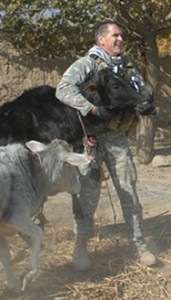Veteran Vet Returns from War Zone to Cecil County SPCA
It’s a long way from Cecil County to Afghanistan, from treating dogs and horses here to dodging rocket attacks to work with Special Forces teams in remote villages. But Dr. Gregory McDermott, a veterinarian and a Major in the US Army Reserves, has done it all in the past year or so.
“I traveled the whole eastern third of Afghanistan and treated over 2,000 animals,” he said. He also trained US military paramedics in treating animals and was a goodwill ambassador with Special Forces units in efforts to “win the hearts and minds of the people” by treating their animals in rural areas.
“Their goats, sheep and camels are like money and social status to the Afghan people,” Dr. McDermott said. When a small team of Special Forces personnel arrived in a village—after combat units had cleared the area of Taliban sympathizers—villagers were aloof or wary of the Americans. But when they learned that a veterinarian had arrived to help them, “the people came out in droves” and brought their animals.
Dr. McDermott came back to Cecil County from his one-year deployment a few weeks ago, returning to his previous post as the full-time veterinarian at the Cecil County Society for the Prevention of Cruelty to Animals, Inc. animal shelter and veterinary hospital, on Route 213 in Chesapeake City. His own dog, Radar, was cared for by a friend in Cecil County during his deployment.
“It’s good to be back and see some of my former patients and getting to know many new patients,” he said. He will be treating the homeless animals housed at the shelter as well as seeing private patients as part of the SPCA’s low-cost veterinary clinic, which provides spay/neuter services, vaccinations and general veterinary care. [See link here: http://www.cecilcountyspca.org/clinic.html
During his Afghanistan service, Dr. McDermott had a very special patient: Andy, an active duty explosives detection dog who was beloved by soldiers as a “sweet” friend in his off-duty hours and a “fierce” highly-trained canine soldier on-duty.
Dr. McDermott also treated many of the stray dogs that were befriended by US soldiers and became part of the security for American forces in the area. The dogs were effective deterrents against intruders, he said, and several of his patients were formally adopted by solders and went home with them at the end of their deployments.
While he was based at a large airbase, Dr. McDermott made frequent forays into the countryside. “We went into some pretty rough areas,” he said, arriving by armed helicopters. Indeed, his introduction to Afghanistan was a rocket attack that whizzed just past him and sent debris into a shower all over him. “Just my luck,” he said with a laugh.
Then, on his first foray with a Special Forces team into a remote area, there were concerns that the unit might come under attack and he was asked to man a heavy duty machine gun. With his past military experience and training, he was prepared but the concerns turned out to be a false alarm.
Dr. McDermott is no stranger to the military and overseas deployments. Before joining the Army Reserves in 2008, he previously served as a Captain in the US Marine Corps on active duty, from 1987-1994, with deployments to Japan.
Dr. McDermott received his veterinary degree from the Royal Veterinary College in London, England and held a surgical internship in large animal medicine at the famed New Bolton Center of the University of Pennsylvania, where Barbaro was treated after his injury in the Preakness. Dr. McDermott also received a Master’s degree in large animal reproductive medicine from Penn State and a Bachelor’s degree in animal science from Delaware Valley College in Pennsylvania.
As for the war in Afghanistan, Dr. McDermott said US forces have had success in “putting the Taliban on the run.” He said the units, such as his, going into remote areas have also helped win over local residents and turn them against the Taliban.
But for the future, as the number of American forces in-country are reduced, the picture is mixed, he said. Some top-level Afghan security forces trained by the Americans are professional and dedicated to a democratic future, while lower-echelon forces are “corrupt” and unprofessional.
From his own experiences, including losing some friends to terrorist attacks and witnessing terrible injuries, Dr. McDermott said that “it definitely changes your perspective on life and on people” and “it’s really good to be home.”






Such a wonderful article to remind all of us, on the Fourth of July and afterwards, of the dedication of our fellow Cecil County residents to serve our nation. It is maybe surprising, but it shouldn’t be, that we need veterinarians to serve our hero soldier-dogs who sniff out bombs overseas! Thank you so much for your service, Dr. McD!